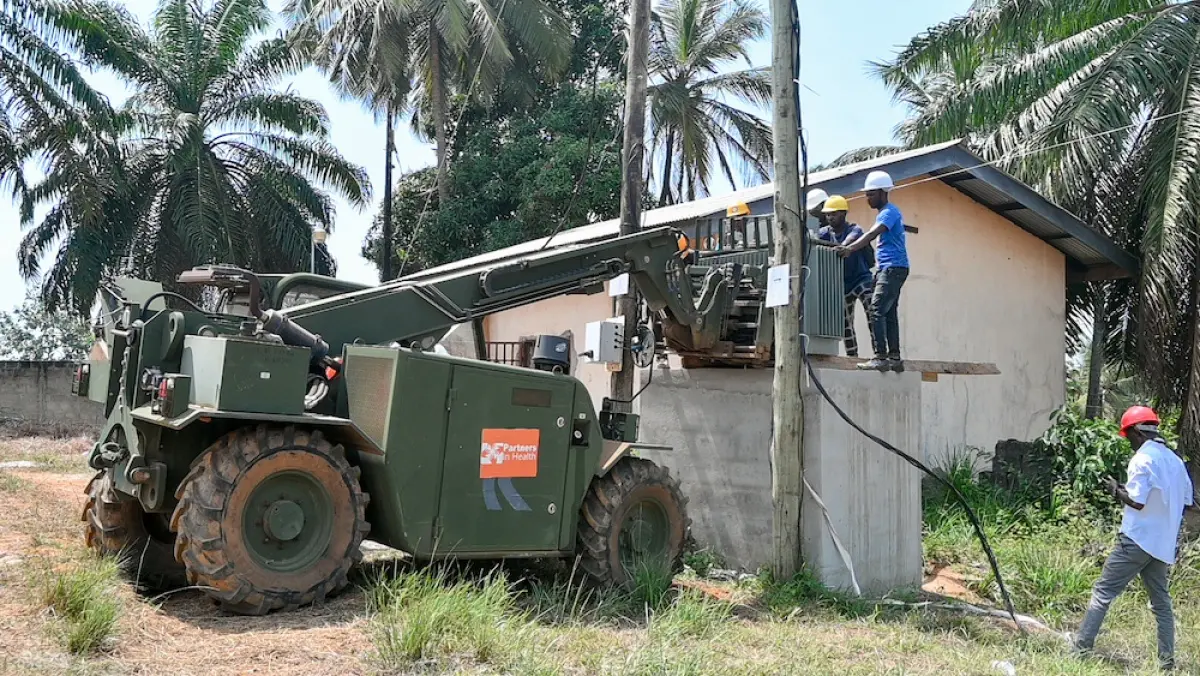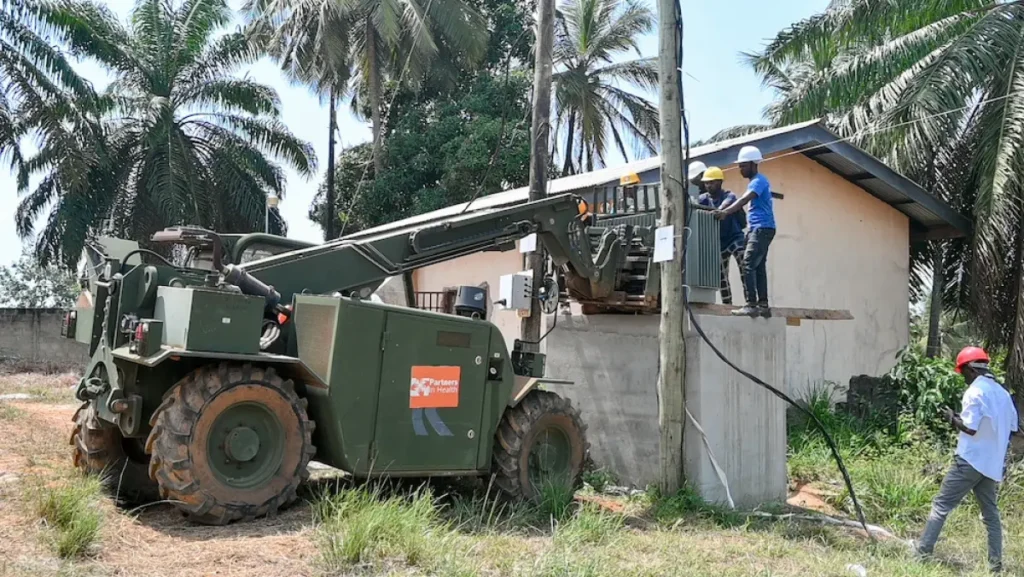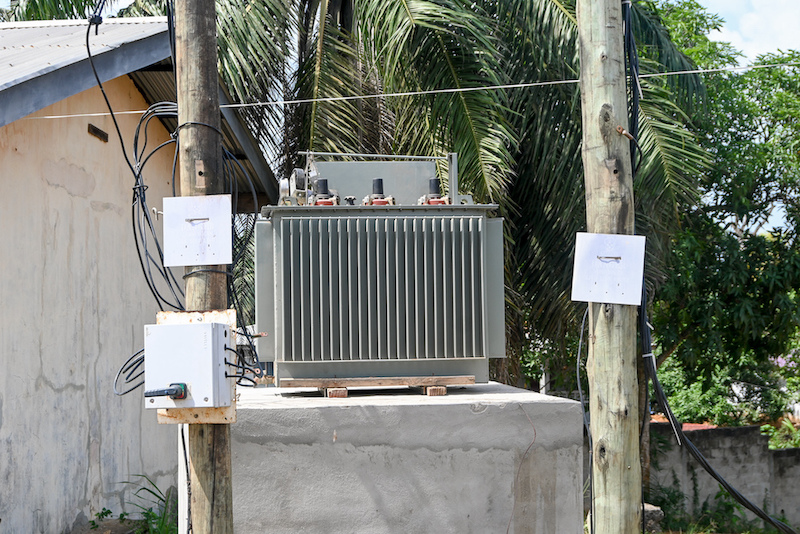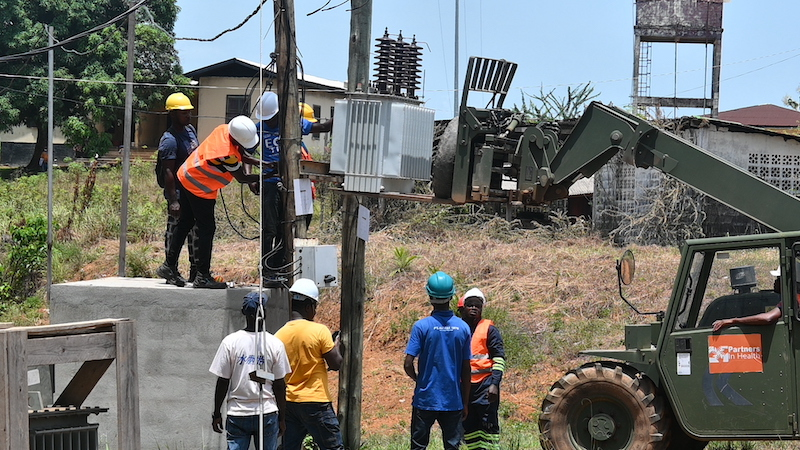Keeping the Lights on for Patients, Providers at Key Hospital in Southeast Liberia

PIH reinforces electricity at J.J. Dossen Memorial Hospital to enhance safety and quality of care
Posted on Sept 12, 2022

Electricity is non-negotiable. Yet it is simply not a reality at health centers, clinics, and hospitals around the world for a variety of reasons, principally due to years of disinvestment in local health systems scarred by war, epidemics, colonial mismanagement, and unjust global policy and financing.
Liberia knew this reality well. When Partners In Health was invited by the national government to help respond to the Ebola outbreak in 2014, electricity at health facilities, such as J.J. Dossen Memorial Hospital in southeastern Maryland County, was unreliable.
“J.J. Dossen had a serious power problem because all the electrical grids were very old and could not really function. There were always power outages, fluctuations of power, lots of wires getting burnt, and [electrical] shocks,” explains Eugene Cheebo, PIH Liberia’s head of maintenance. “PIH saw the need to upgrade the electrical system and now we are not having any [of those] problems at the hospital.”
Since work began, infrastructural upgrades made by PIH and the county health team have protected against fires from corroded wires and reduced the number of patient deaths. The facility’s improved electrical capacity is allowing for better care as lifesaving procedures continue without clinicians and staff being concerned about supply.

“Those improvements, among others made over the last several years, have had a direct impact on patients. Most notably, the death rate at the hospital has improved, according to data from the District Health Information System at the Ministry of Health, from 138 in 2016 to 73 in 2021,” says Maryland County Health Officer Dr. Methodius George.
A Look Back
The hospital has struggled to keep the power on since its inauguration in 1960. The national grid, responsible for powering the facility, was destroyed during the first Liberian Civil War in 1990, cutting off all electrical supply. The hospital relied on a 30 kilovolt (kV) generator donated by humanitarian agencies to power the facility; but it was not strong enough to meet demand and was a major strain on the hospital’s overstretched budget.
As George explains: “We did not have room in the budget to run a generator, so the generator was run for about four hours during the day and turned back on during the night. It was on longer during the day in extreme cases when we had emergencies that needed to be treated with electricity, especially our cesarean sections.”
Fortunately, in 2015, Maryland County was connected to the West Africa Power Pool, which provides electricity for the hospital and some local communities. Although the power from the West Africa Power Pool has improved the situation, it has been sporadic and unreliable. The supply comes from neighbouring Ivory Coast; when there are disruptions in this neighbouring country, there is no local supply to tap into.
PIH added a 45 kV generator in 2016 in response to this need. Yet power from the two generators combined could only provide electricity for critical sections of the hospital, such as the operating rooms and emergency ward.
And there was another issue at hand. J. J. Dossen Memorial Hospital’s transformer was not powerful enough to regulate the increased electrical capacity, and it frequently malfunctioned. The two problems needed to be addressed simultaneously; the power supply had to be increased to meet demand, and the hospital required a transformer big enough to regulate that increased flow of electricity.

“The team is prepared”
With support from the Ministry of Health, J.J. Dossen Hospital acquired a 165 kV generator in 2018, but lacked funding to operate and maintain it. After consulting with the county health team in 2021, PIH offered to take on the responsibility of operating the generator to provide consistent electricity for health care delivery and the hospital’s operations. This required replacement of the old transformer with a 250 kV transformer—one with enough capacity to handle the increased flow of electricity—and total re-wiring of the facility to extend electricity supply to a long list of locations throughout and around the hospital: the surgical theater, pharmacy, eye clinic, county tuberculosis unit, pediatric unit, obstetrics and medical wards, electrical control, X-ray room, and laboratory.
“The new generator is expected to support the facility for a few years and will continue to greatly improve patient care,” says George. “If a problem arises, the team is prepared. All technicians were trained by PIH on how to quickly and efficiently troubleshoot electrical problems by going directly to the source rather than shutting down the entire compound.”
In the future, PIH and the Ministry of Health plan to install a more powerful transformer to further improve and support the hospital’s electrical need. Ultimately, they’d like to invest in solar power, as it’s the most cost-effective and convenient option.
Running facilities on solar power would ultimately be good for the environment, and good for the hospital’s hometown of Harper—known locally as “the land of sunshine and happiness.”
Originally published on pih.org
In southeastern Liberia, mental health services are limited and residents often turn for relief to traditional medicine and witchcraft. Together, PIH staff and health care workers began to work with traditional and religious healers to ensure continuous care for patients by training them to identify and refer people with common mental disorders from the community to health facilities for treatment.



